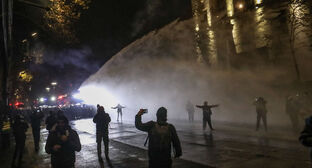30 March 2010, 21:00
Terror acts in Moscow raise death penalty issue again
After the explosions in Moscow metro, President of Russia Dmitri Medvedev has stated the need to get back to the problems of executing justice under the articles of the Criminal Code of the Russian Federation dealing with terrorism; and the Council of Federation started talking about introduction of death penalty for the organization and committing terror acts.
Let us remind you that on March 29, at 7:56 and 8:40 a.m. Moscow time accordingly explosions were triggered at Lubyanka and Park Kultury stations of Moscow metro.
Having stated the need to toughen the legislation on "terrorist" articles, the head of the state also suggested "paying more attention to some issues of perfecting the legislation directed towards prevention of acts of terror."
In particular, possible changes should ensure "clear work of various departments engaged in investigating such crimes and other procedures related to transport safety and security in those places where crowds of people get together," the ITAR-TASS quotes Dmitri Medvedev as saying.
Death penalty for terrorism: pros and contras
In the meantime, the Council of Federation has undertaken to draft amendments to the current criminal legislation assuming death penalty for organization and execution of terror act which have entailed mass human losses.
"This is our reaction to yesterday's tragic events in Moscow," said Anatoly Lyskov, chairman of the committee of the Council of Federation on legal and judicial issues. In spite of the fact that today Russia is under moratorium on death penalty, Mr Lyskov believes that in the conditions when such crimes are committed, the society should be offered some new variant of criminal punishment. "That the people who go to a terror act knew what to expect," said the senator as quoted by the "NEWSru.com".
Another amendment, which, according to Mr Lyskov, the committee is going to make in the criminal legislation, assumes that those guilty of terror acts which have entailed mass human deaths should have no right to pardon.
Later, Alexander Torshin, first vice-speaker of the Council of Federation, said that the upper chamber of the parliament was not drafting any bill on death penalty for terrorists.
However, he said that a working group was set up under the committee on legal and judicial matters to consider the issues of improving the legislation on fighting terrorism, the "Interfax" reports.
"It especially refers to those terror acts which have caused mass human losses, but, I repeat, the point is to toughen punishments, not to introduce the death penalty and lift the moratorium," said the first vice-speaker.
At the same time the lower chamber of the Russian parliament suggests improving the overall performance of law enforcement bodies in capturing of criminals.
"We can pull terrible grimaces in the form of death penalty, but it would be much more efficient, if organizers all better caught than intimidated," said Pavel Krasheninnikov, head of the State Duma committee on civil, criminal, arbitration and procedural legislation.
He believes that death penalty is an inefficient measure; whether it is applied or not has no effect on the criminal situation.
"It was reconfirmed by yesterday's terror acts, as suicide-bombers went and blew themselves up; they didn't care about the death penalty," the "Interfax" quotes the MP as saying.
War on terror in Russia: view from abroad
Meanwhile, foreign mass media are confident that the methods of fighting militants in the territory of Russia will be toughened; however, they believe that the results of such struggle will be far from what is expected.
In particular, as The Times writes, Russian President Dmitri Medvedev faces an uneasy choice: how to toughen measures against militants, but, at the same time, not to exacerbate local residents, who can involuntarily suffer from repressions.
The New York Times is sure that Russian Premier Vladimir Putin will unequivocally react to terror acts: special operations against militants will be held by still tougher methods.
However, in the opinion of the paper, the terror acts may challenge Mr Medvedev's course, who believes that war on terror should assume, in particular, eradication of key reasons of the insurgent movement - poverty and corruption.
Thus, the explosions in Moscow may give Putin a chance "to push Medvedev aside" and pursue his tough policy with the help of his security advisers. An indirect confirmation can be found in the yesterday's offer of the leaders of "Edinaya Rossiya" to draft a new severe plan of counteracting terrorism, The New York Times reports.
The Financial Times objects writing that Mr Putin understands: the problem of terrorism cannot be solved by retaliatory measures only.
Nevertheless, the Prime Minister prefers to follow the simplest way: to support local leaders, for example, President of Chechnya Ramzan Kadyrov. However, there will be no success without political cooperation, respect for the law and good relations with the neighbours, the edition believes.




